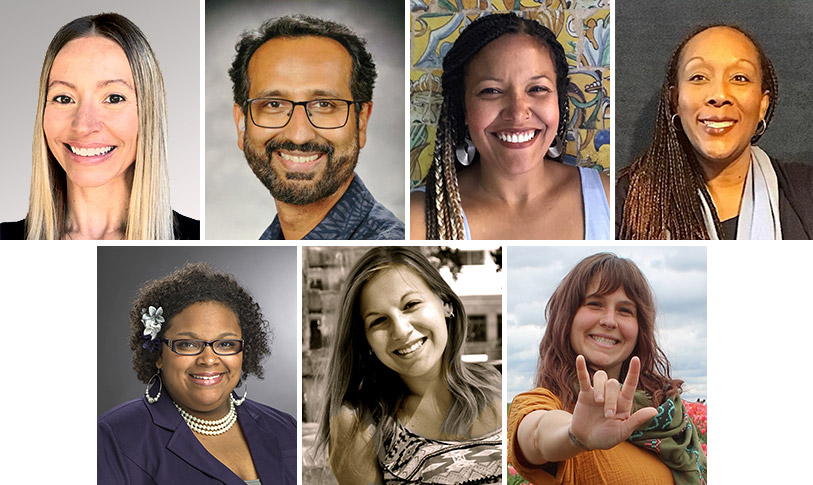RIT/NTID’s Project Fast Forward announces advisory board
Project offers STEM college courses to deaf, hard-of-hearing high school students
Project Fast Forward offers qualified dual-credit college courses in STEM to deaf and hard-of-hearing high school students across the country.
A panel of professionals representing all aspects of Deaf education have been named to the advisory board of Project Fast Forward, a program at Rochester Institute of Technology’s National Technical Institute for the Deaf. Funding for the board was made possible through a grant from Microsoft Corp.
Project Fast Forward offers qualified dual-credit college courses in STEM (science, technology, engineering, and math) to deaf and hard-of-hearing high school students across the country. The goal of the program is to help deaf and hard-of-hearing students transition from high school to college and earn a college degree in STEM fields.
The dual-credit courses are offered by RIT/NTID and are taught at the students’ high schools by their own teachers during regular school hours. Courses are offered in schools for the deaf, as well as in public high schools with programs for deaf and hard-of-hearing students. Credits earned by students can be used toward a degree at RIT/NTID or any college across the country that accepts the credits.
Advisory board members will serve a two-year term to provide advice and expertise in areas including:
- Development of culturally relevant and culturally sustaining STEM curriculum
- Incorporation of appropriate and accessible technology in teaching STEM coursework
- High school to college, and college to employment transition
- Student academic achievement and preparedness for success in college
- Strategies to prepare teachers to provide STEM coursework.
Advisory board members are:
Christina Hopewell-Albert provides oversight to online education programs as director of CSD Learns at Communication Service for the Deaf, Inc. Her approaches involve adapting current education trends, collaborating with online education experts, and extending virtual education services to educational institutions, businesses, for- and non-profit organizations, and federal entities. She earned her bachelor’s and master’s degrees in linguistics from California State University Northridge and Gallaudet University, respectively, and her doctorate from Northeastern University, specializing in curriculum, teaching, learning and leadership. Hopewell-Albert’s areas of interest focus on learning experiences associated with multicultural content within the curriculum in ASL virtual classrooms. She also explores best practices in quality assurance through assessments of instructional content in every stage of the process of the delivery to ensure successful learning experiences.
Sinju Engineer is originally from Mumbai, India, and immigrated to the United States when he was 17 years old. He is in his 12th year teaching career technical education courses at California School for the Deaf, Fremont. Engineer enjoys providing middle- and high-school Deaf students with a variety of fun and creative hands-on lab experiments.
Onudeah “Oni” Nicolarakis is an assistant professor at Gallaudet University’s Department of Education. She has been an educator for more than 15 years, having served Deaf, DeafBlind, DeafDisabled, hard-of-hearing, learning disabled, and hearing students ranging in ages from three to adulthood, and has used multimodal approaches to provide access to academic and social content. Nicolarakis has presented on topics such as the intersections of race and disability. Her areas of interest are in producing counter-narratives of the writing experience for the Deaf, DeafBlind, DeafDisabled, and Hard-of-Hearing communities, and redirecting attention to the advantages of the intersectional experiences from people within marginalized communities.
Liann Osborne is the first Black Deaf career technical education principal at the California School for the Deaf, Fremont. Her doctoral dissertation from California State University, East Bay centered on educators who reinforced and countered anti-Blackness while working with Black Deaf students. Working with Black and Brown Deaf students, Osborne works to ensure that their existence matters, which requires her particular brand of compassion, love, and warmth.
Sarah E. Sarchet is a senior lecturer in the science and mathematics department at NTID. Sarchet holds a bachelor’s degree in biology and a master’s degree in Deaf education. She has more than 10 years of experience creating a fun and engaging learning environment. She has served as a teacher trainer in Project Fast Forward since 2019. Additionally, Sarchet is the director of the NTID Faculty Fellowship Program, and the Faculty Associate for Non-Tenure Track Faculty in the Office of the Provost at RIT.
Laurel Silverstein is an adjunct professor at Carolina University in the Deaf studies department, and an administrative assistant for the Dean at the University of the Pacific, Arthur A. Dugoni School of Dentistry. She has been an educator for more than 10 years, and her teaching experience includes working with low socioeconomic students struggling with homelessness, and international education. Upon graduating from Gallaudet University, Silverstein relocated to Israel where she obtained her master’s degree from Tel Aviv University, and was able to learn more about multicultural education with deaf and hearing demographics.
Elle Zusi is a Jewish DeafDisabledAutistic Queer Non-Binary artist and teacher of the Deaf based in Portland, Oregon. Zusi works in the Deaf education field toward equity for all Deaf people, and believes that art is a way of sharing their heart with the world in a way that transcends communication barriers. Zusi’s work both in art and in the Deaf and Disability communities is justice- and healing-oriented, and seeks to uphold Angela Davis’ words, “we must act as if it were possible to radically transform the world, and we must do it all of the time.”
“We are fortunate to have such talented professionals serving on the RIT/NTID’s Project Fast Forward Advisory Board,” said Gerry Buckley, NTID president and RIT vice president and dean. “We are grateful for their time and expertise.”
The advisory board of Project Fast Forward, top row, from left: Christina Hopewell-Albert, Sinju Engineer, Onudeah “Oni” Nicolarakis, Liann Osborne. Second row, from left: Sarah E. Sarchet, Laurel Silverstein, Elle Zusi.




